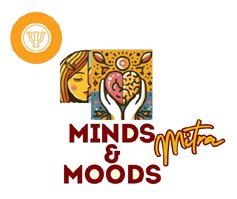The Mind of a Champion: A Guide to Sports Psychology Counselling 🧠
Sports psychology counselling is a specialized field that focuses on the mental and emotional factors that influence an athlete’s performance. It’s a proactive approach used by a psychologist or mental health counsellor to help athletes, coaches, and teams overcome mental barriers, enhance performance, and manage the unique pressures of competitive sports. This form of counselling recognizes that an athlete’s mental game is just as important as their physical training.
A Trusted Professional in Nagpur: Rrimi Bodalkar
In Nagpur, Rrimi Bodalkar, a Sr. Psychotherapist / Mental Health Counsellor, is a highly qualified professional who can provide expert sports psychology counselling. With her M.A. in Psychology (Counselling) and PGDMH (Clinical), she has a strong foundation in a wide range of therapeutic practices. Her specialization in CBT, REBT & DBT (Specialised) makes her particularly adept at helping clients manage the emotional and psychological toll of competition. As an NSDC Certified professional in Psychometric Analysis & Learning Style Assessment, she can provide valuable insights into an athlete’s personality and cognitive strengths. Her expertise is not limited to sports; she can also help with issues like workplace stress counselling, public speaking anxiety treatment, and general personal counselling, ensuring a holistic approach to an athlete’s well-being.
When to Seek Support: Symptoms & Causes
An athlete’s mental struggles can impact their performance just as much as a physical injury. The symptoms that may indicate a need for sports psychology counselling include:
- Performance Anxiety: Experiencing a fear of failure, choking under pressure, or a decline in performance during competition. This is a form of public speaking anxiety treatment but for the sports arena.
- Loss of Motivation: A feeling of burnout, a lack of passion for the sport, or a general sense of apathy. This may also require workplace stress counselling.
- Difficulty with Focus: Trouble staying concentrated during a game or practice, or a persistent habit of negative thinking after a mistake.
- Emotional Distress: Experiencing depression, extreme frustration, or anger that affects performance and team dynamics.
- Coping with Injury: Struggling with the emotional and mental toll of a career-ending or serious injury, which may require trauma therapy or grief and loss counselling.
The causes of these issues can be a combination of intense pressure, high expectations from coaches and family, perfectionism, or an inability to manage setbacks. Just like a professional in a corporate setting, an athlete can experience significant workplace stress.
The Counselling Procedure: Building Mental Strength
The procedure of treatment in sports psychology counselling is highly personalized and tailored to an athlete’s specific needs and goals. A psychologist uses a variety of evidence-based techniques to help an athlete build mental resilience.
- Assessment and Goal Setting: The professional begins by conducting a thorough assessment to understand the athlete’s mental strengths, weaknesses, and performance goals. This may involve using Personality assessment tools or other forms of Psychometric Analysis.
- Skill-Building: The counsellor will teach the athlete a range of mental skills to use both in practice and competition. These can include:
- Visualization: Mentally rehearsing a performance to build confidence building.
- Mindfulness & Focus: Learning to stay present and focused on the task at hand, blocking out distractions.
- Emotional Regulation: Using techniques from Dialectical Behavior Therapy (DBT) or Rational Emotive Behavior Therapy (REBT) to manage emotions like frustration and anger.
- Positive Self-Talk: Using Cognitive Behavioral Therapy (CBT) to challenge and reframe negative thinking patterns.
- Behavioral Interventions: This may involve implementing behavioral therapy techniques to help an athlete stay consistent with their training, develop a pre-competition routine, or manage a fear of failure.
- Performance Enhancement: The goal is to help the athlete perform at their peak level by creating a mental environment that supports success. This can also overlap with executive coaching, as both fields focus on high-performance individuals.
Frequently Asked Questions (FAQ’s)
Q1: How is a sports psychologist different from a general psychologist?
A: While both are trained to provide counselling, a sports psychology professional has specialized knowledge of the unique pressures and mental demands of competitive sports.
Q2: Can sports psychology help a team, not just an individual?
A: Yes. A sports psychology professional can work with a team to improve communication, resolve conflicts, and build cohesion. This can be seen as a form of couple therapy or relationship counselling on a larger scale.
Q3: Is sports psychology only for professional athletes?
A: No. Athletes at any level—from youth to collegiate to professional—can benefit from sports psychology counselling. The mental skills learned are applicable to any competitive environment.
Q4: Can a counsellor help with anger management in a sport?
A: Yes. A core part of sports psychology counselling is helping athletes learn to manage their emotions, including anger, in a productive way. Techniques from DBT and CBT are particularly effective here.
Q5: What’s the relationship between a sports psychologist and an IQ testing psychologist?
A: While not directly related, a sports psychologist may use a person’s cognitive strengths, which can be identified through a Neuropsychological testing or a IQ test, to help them develop strategies for better performance.

